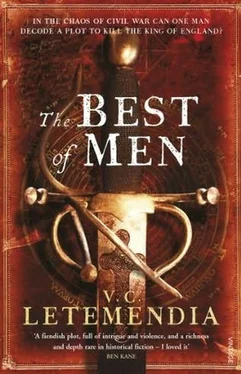Claire Letemendia - The Best of Men
Здесь есть возможность читать онлайн «Claire Letemendia - The Best of Men» весь текст электронной книги совершенно бесплатно (целиком полную версию без сокращений). В некоторых случаях можно слушать аудио, скачать через торрент в формате fb2 и присутствует краткое содержание. Год выпуска: 2009, ISBN: 2009, Издательство: McClelland & Stewart, Жанр: Исторические приключения, на английском языке. Описание произведения, (предисловие) а так же отзывы посетителей доступны на портале библиотеки ЛибКат.
- Название:The Best of Men
- Автор:
- Издательство:McClelland & Stewart
- Жанр:
- Год:2009
- ISBN:978-0-7710-5274-3
- Рейтинг книги:5 / 5. Голосов: 1
-
Избранное:Добавить в избранное
- Отзывы:
-
Ваша оценка:
- 100
- 1
- 2
- 3
- 4
- 5
The Best of Men: краткое содержание, описание и аннотация
Предлагаем к чтению аннотацию, описание, краткое содержание или предисловие (зависит от того, что написал сам автор книги «The Best of Men»). Если вы не нашли необходимую информацию о книге — напишите в комментариях, мы постараемся отыскать её.
The Best of Men — читать онлайн бесплатно полную книгу (весь текст) целиком
Ниже представлен текст книги, разбитый по страницам. Система сохранения места последней прочитанной страницы, позволяет с удобством читать онлайн бесплатно книгу «The Best of Men», без необходимости каждый раз заново искать на чём Вы остановились. Поставьте закладку, и сможете в любой момент перейти на страницу, на которой закончили чтение.
Интервал:
Закладка:
Claire Letemendia
The Best of Men
He that weareth his heart in his fore-head, and is of an overt and transparent nature, through whose words, as through cristall, ye may see into every corner of his thoughts: That man is fitter for a table of good-fellowship, then a Councell table.
Upon the Theater of public employment, either in peace or warre, the actors must of necessity weare vizards, and change them in evarie scene.
Wherefore a Prince may pretend a desire of friendship with the weaker, when he meanes, and must, contract it with the stronger.
From Robert Dallington’s 1613 translation of the Civil and Military Aphorisms of Guicciardini which he dedicated to the “High and Mightie Charles, Prince of Great Britain,” the future King Charles I.
PROLOGUE
Cadiz, Spain, July 1642
At a sharp bend on the road to Cadiz, Laurence heard a strangled cry pierce the air, as of a man being choked.
“God damn,” he muttered, reining in his horse. If there was trouble up ahead, he could not circumvent it. To his left, sheer cliff descended to the sea miles below, and to his right, the barren, rocky hillside rose up too steeply for his horse to negotiate a path. Yet what did he care, anyway, he thought; he had no fear for himself.
Urging his mount forward again, he rounded the bend. Some twenty yards from him, a couple of men were assaulting an elderly fellow: one held a knife to his throat while the other searched him roughly. Both thieves were barefoot and scrawny, dressed in rags. They were jeering at their victim, doubtless pleased to have hit upon such easy prey, and so intent on their work that they did not notice Laurence. Nearby, indifferent to the spectacle, a pack mule stood nosing at the dusty earth.
Heaving a sigh, Laurence drew out his pistols. Empty as they were, he levelled them at the thieves. “ Déjale ,” he yelled resignedly.
They turned, clearly taken by surprise. One bolted off immediately and scrambled up the hill, agile as a mountain goat.
Laurence watched him disappear before addressing his accomplice, who still had his blade tight to the old man’s neck. “I said, leave him alone! And get lost before I shoot you.”
“Get lost yourself, you son of a whore,” the thief retorted with impressive bravado. “I was here first.”
Laurence could not help smiling. “I’m not in your trade, and I have money. I’ll give it to you, if you release him.” He tossed the pistols some distance from his horse, catching as he did so an anguished flicker in the old man’s eyes. Wary but curious, the thief squinted at Laurence as he dismounted and reached into his saddlebag. He withdrew his purse and poured from it a few coins, letting them slide through his fingers. Next he shook the purse, which emitted an unmistakable clinking sound, and threw it on the ground. “You can have the horse as well. In fact, you can have everything.” The thief’s confusion was so obvious that Laurence nearly laughed; no sane person would freely surrender his horse and weapons in such desolate countryside. “So, what are you waiting for?” he demanded, becoming impatient.
The thief stepped away from his victim to approach the purse, staring at it greedily. As he was about to snatch it, Laurence moved faster, kicking him in the shoulder. He howled, though he did not drop his knife. Grabbing Laurence by the knees, he brought him down, and they wrestled together in the dirt, rolling dangerously close to the edge of the precipice. The thief was all muscle, his grip on the weapon like a vice. He fought harder than Laurence, who only wished to allow the old man time to escape, and then let it all end quickly.
At length Laurence stopped struggling altogether. The thief was on top of him, aiming the steel point at his heart. Laurence gazed straight into his eyes and knew: the thief was afraid. “What’s wrong with you, never killed a man before?” he taunted him contemptuously.
The thief scowled and bore down with the knife. But as the tip of the blade pricked Laurence’s flesh, he smelt the thief’s rotten breath full in his face and the stink of it roused his disgust: he was not prepared to die like this. He struck at the knife, which flew from the man’s hand, and they began to wrestle again. He was unconscious of his actions, relying on instinct honed by long practice, the blood pounding in his ears and seething in his veins as if he were in the midst of battle. Suddenly he heard the thief shriek, and felt him grow limp and heavy. He thrust aside the body and lay back, panting; he must have managed to fish out the slim dagger that he always kept in his doublet, for it was driven to the hilt into the thief’s chest, and his left hand was wet and sticky with gore.
He looked over at the old man, who was still beside the mule, his expression a mixture of puzzlement and awe. “You’re safe,” said Laurence. “You can be on your way.”
“Bless you, sir.” The man’s face, brown and wrinkled like a cured olive, broke into a wide grin. He picked up the purse, the scattered coins, and the pistols and set them down neatly beside Laurence. Then he went over to the corpse and, without a hint of distaste, pulled out the dagger and cleaned it on the thief’s rags. “You took a wild risk, in letting him have the advantage. To bluff with one’s life is true courage.” He frowned at Laurence thoughtfully. “Or else madness.”
“It wasn’t courage,” Laurence said, sitting up to accept the knife from him.
“Whichever the case, you saved my life.” The man produced a flask from a pocket in his travelling cloak and offered it to Laurence; it contained cool water, more reviving to Laurence’s parched mouth than any spirits. “Are you bound for Cadiz, as I am?” Laurence nodded, drinking. “In return for what you have done, you must come to my house there, as my guest. I insist!”
Laurence hesitated. He would have preferred to refuse, but more thieves might be lurking about, and he did not want to leave the fellow unprotected. “Very well,” he said, as he rose, wiping his hands on his already stained breeches.
“God is great,” the man exclaimed, patting him on the shoulder. “God is great.”
As they proceeded together on foot, walking their beasts, the man explained that he was a merchant returning from Tarifa. “I had to collect a bolt of silk, and while I was waiting to receive it, my two servants fell ill. They could not escort me back, but I was in a hurry to get home, so I set out alone. What a fool — and I could have been a dead fool had you not chanced by and rescued me. My name is José Moreno, sir. What is yours, and where are you from?” When Laurence told him, he seemed bemused. “An Englishman, are you? You don’t look like a foreigner — and you speak with no accent. Indeed, at first I confess I thought the same as the thief — that you were another brigand,” he remarked, surveying Laurence’s garments. “Yet with this handsome black stallion — not to mention your gold, and your expensive arms — you are more of a target for robbery than I.”
Dusk had fallen by the time they arrived at Cadiz. José guided him through winding streets to a passageway between high, forbidding walls. They reached a door upon which José knocked several times, in a distinct pattern. A servant as brown-skinned as he admitted them into a large torch-lit courtyard where fruit trees and flowers bloomed; the house was constructed in a square around it, with covered galleries on all sides.
While Laurence peered around, amazed that such beauty and luxuriant growth could be so perfectly concealed from the street beyond, the servant bowed to him, handed him down his saddlebags, and led away his horse and the mule. Then José took him beneath one of the galleries, saying, “We should not eat until we have cleansed ourselves.” He paused a moment before calling out, “Khadija!”
Читать дальшеИнтервал:
Закладка:
Похожие книги на «The Best of Men»
Представляем Вашему вниманию похожие книги на «The Best of Men» списком для выбора. Мы отобрали схожую по названию и смыслу литературу в надежде предоставить читателям больше вариантов отыскать новые, интересные, ещё непрочитанные произведения.
Обсуждение, отзывы о книге «The Best of Men» и просто собственные мнения читателей. Оставьте ваши комментарии, напишите, что Вы думаете о произведении, его смысле или главных героях. Укажите что конкретно понравилось, а что нет, и почему Вы так считаете.












